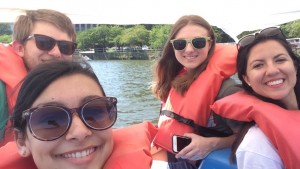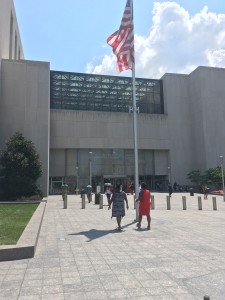Look into the Future, Make Your Case, and Keep Exploring
Sometimes I think that if we could look into a crystal ball and see into the future, life would be so much easier. I think foresight is an important part of being a good leader. Trying to look ahead and foresee problems, challenges, and areas with greatest potential for successful change is really important when it comes to making decisions in the now. The leaders of my nonprofit and of my team are very talented when it comes to thinking ahead throughout the planning process. Though it is impossible to think of all of the possible outcomes of any given situation, it is important to realize that the decisions you make (however little) impact the future success and reach of your organization.
I have also learned that being a good leader involves being connected to the members of your team and being connected to the people you serve. A large focus of our team this summer was to build a greater sense of community among our interpreters. One thing that has proven very successful is hosting office hours where interpreters may come in and speak about their experiences.
I’ve learned a lot about myself as a working professional and this experience has helped me gain confidence with working on a team and in an office setting. One thing that I have learned is that it is of great importance to me to feel as though I am helping my team members and for this reason I make a point of checking in with them frequently. I never want to feel disconnected and as though I am not a contributing member of any team I am a part of. Collaborating effectively is something that I value greatly as a working professional. I have also learned that as much as I like structure, I like the unexpected elements of my job such as unplanned conversations with interpreters, visits to law firms, and in-person trainings for other nonprofits.
The highlight of my week and one of the highlights of my internship happened this week. On Wednesday, I observed a Civil Protection Order Hearing at the DC Superior Court for a woman who was a victim of domestic violence. It was an experience that I will never forget. I watched one of Ayuda’s staff attorneys construct a powerful case for why this woman should be granted protection from her abuser. It was incredible to watch her think quickly on her feet, ask carefully constructed questions, and deflect the argument of her client’s abuser with strong evidence. Though at times the hearing was hard to watch, every moment was compelling and moving.
Because our client was not English-proficient, interpreters were necessary. It was also wonderful to watch the Ayuda interpreters play a critical role in the telling of our client’s story. I got to witness firsthand how a language barrier directly prevents a person from accessing justice. Without an interpreter, our client would not have been able to tell her story. And without a qualified interpreter, our attorney’s case would not have been as strong because the meaning of her questions may not have been interpreted the way that she intended. When it comes to law, language is very important.
At the end of the hearing, I was proud to be one of the women sitting on our client’s side of the courtroom. After the hearing, our client hugged each of us and thanked us for our presence. I was moved again by her kindness and the strength she had shown even while having to be in the same room as her abuser.
Another highlight of my work week was attending another DC Consortium of Legal Service Providers meeting where we discussed the intersection of mental health and the provision of legal services. The highlight of my week outside of work was going paddle boating on the Potomac with friends from Wake Forest and visiting the National Air and Space Museum.
– Sophie Leruth (Class of 2019)


